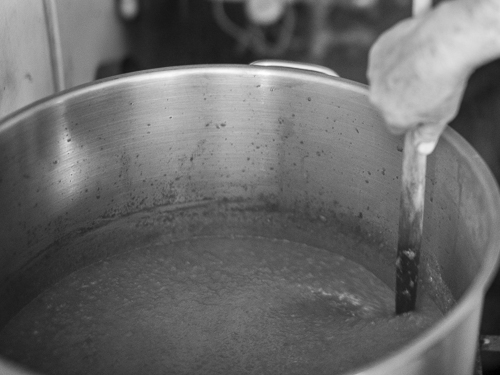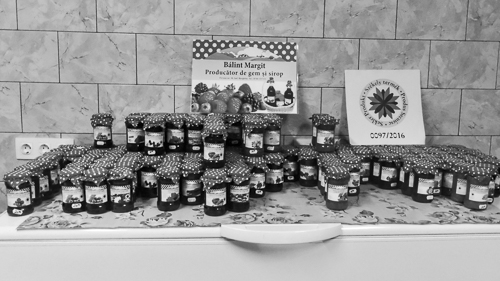On the way to Mr Bálint’s house, a black bear was crossing the road slowly in front of us. However, when we passed the place where it had crossed the road, we couldn’t see it. Anyway, both my guides told me that bears have caused lots of problems for people in the countryside, killing domestic animals. Unfortunately, there is no compensation for the loss of one and bears are protected against hunting.
Having arrived, my guide told Mr Bálint about the bear and he told him that it was a bear which was well-known to the villagers.
Although we arrived in the evening, both mother in her seventies and son in his fifties were busy working, preparing products for going to a market in Budapest. Actually, there would be 2 events the coming weekend, one with a honey producer/beekeeper and another one with his mother.
They produce 34 types of jams and 18 types of syrups and the son was putting a large selection of jams on top of a freezer.
She started making products and going to markets in 2009 and he joined her in 2010.
While the son was preparing jams, his mother was preparing zacuscă (RO)/zakuszka (H), a vegetable spread, stirring a red liquid in a kettle on a wood-fired oven with a wooden spoon. The red liquid consisted of smashed beans, aubergine, paprika, onion, salt, pepper, sugar and honey. In fact, there were tubs with mashed beans and eggplant/aubergine, a basket with peppers and a cardboard box with paprika nearby.
They were both working from morning till night in order to get everything ready. However, all their neighbours were also preparing for winter, making jams, syrups, spreads and so on.
In addition to selling farm produce at markets, Mr Bálint has all the required documentation for selling their products in shops.
They have 7000 raspberry bushes inside the village and they have walnut trees inside a 2 hectares plantation. Outside the village, they have an orchard surrounded by a 2.5m fence. Fortunately, they didn’t have any problems with bears.
Like most people in countryside in Transylvania, they also had a chicken coop with various hen races. Surprisingly, a dog was staying with the poultry. Two chickens, one small and one big were living on the lawn under an upside-down basket.
The property was adjacent to the village church and one of the walls of the church formed a wall for the property of this family as well.
Last, but not least, they were collecting herbs, which they would dry and sell at markets.


